THE FAIREST FORCE
15. OFF DUTY
*****
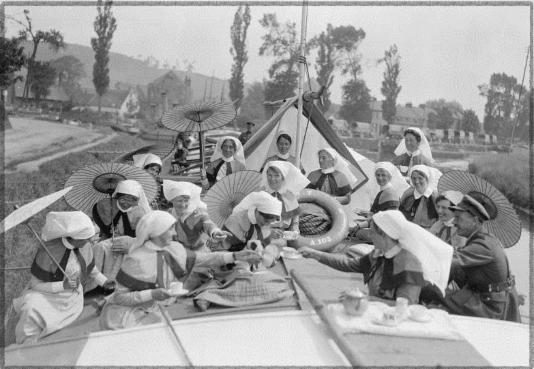
An afternoon off for the staff of an ambulance barge flotilla at Watten [IWM Q8893]
Accounts of the day-to-day life of nurses on active service during the Great War lean heavily on descriptions of extended periods of ceaseless activity. Long hours, heavy convoys, wards full of critically wounded and dying men and all-night sessions in the operating theatre are a major part of many narratives and personal diaries. All these things were indeed at the heart of hospital life in France and Flanders but they only represent one side of daily life for women living and working there in wartime. Throughout more than four years of war there were many long, quiet periods between times of intense military activity. Base hospitals and forward units such as Casualty Clearing Stations were often found with wards nearly empty of patients, and nurses filling their time with ‘spring-cleaning’ even in mid-winter. Overdue annual leave could be taken and extra off-duty offered to give some short respite from long days and overwork.
At that time, nurses employed in the United Kingdom’s civil hospitals worked very long hours compared to today. A sixty-hour working week was usual, made up of twelve-hour ‘split shifts.’ That meant a day-duty nurse might be working from eight in the morning until eight at night, six days a week, with a period of three hours off taken sometime each day, either from 9-12 in the morning, 2-5 in the afternoon, or 5-8 in the evening. It seems disheartening to think of a nurse getting up early and reporting for duty at 8 a.m., before being sent off-duty once again after only an hour. After six days of this routine, the seventh would be a half-day.[167] Nurses usually had just one half-day off each week and a full day once a month. Long hours were a matter of course to trained nurses and their schedule while engaged in military service would be little different and planned around a very similar routine. However, the military situation and the care of patients always took priority. When circumstances demanded, days off would be forfeited and working hours lengthened as appropriate. Most Matrons and senior nurses appreciated that hospital life in wartime was necessarily different to peacetime working and made allowances during quiet periods to enable staff to catch up on rest and enjoy some recreational opportunities.
Those opportunities seem bland today and each activity was considered and screened by the Matron-in-Chief and her staff in order to assess its suitability for military nursing sisters. The majority did not meet her stringent standards. Social interaction with men, if not completely banned, was strongly discouraged, except under certain conditions. All nurses serving with the British Expeditionary Force, both trained and untrained, were considered as having officer status. As such, fraternisation with ‘other ranks’ and non-commissioned officers was never officially approved. This could cause problems where a nurse was already in a romantic relationship with a soldier prior to the war or had a brother or father serving in the ranks, but on the whole most liaisons, if discreetly undertaken, could avoid the radar of even the most eagle-eyed of Matrons. Nursing Sisters and VADs were allowed to have ‘At Home’ afternoons, usually on Sundays, to which they could invite the hospital’s Medical Officers and other male friends as long as they were of the ‘officer class.’ The war diary of the Matron-in-Chief gives some idea as to the variety of events that went to make up the official social life of the nursing staff. Just after Christmas 1915, the Abbeville nurses:
… went to a Christmas tea at the Nurses’ Home which Miss Smythe had managed and arranged everything just perfectly. After tea there was music, bridge and jig-saw puzzles, and the Sisters and VADs from the various units, with the MOs, were invited.[168]
During the summer of 1915 French classes were being held at Mrs. Robertson-Eustace’s Rest Club for Nurses in Boulogne,[169] and performances by the bands of various regiments were popular, particularly outdoors in the summer:
… back at 8 p.m. and learnt that the Artillery Band had arrived and had been playing in the Square and the D.M.S. had invited Miss Beadsmore Smith and Miss Barbier and the 3 VADs to tea and to listen to the band which they had all enjoyed very much.[170]
Living in enclosed communities subject to strict control and discipline for months or years at a time, meant only short periods of leave were available to re-kindle ties with family and friends at home. Serving overseas was a choice that women made, and if they expressed a wish to work in a hospital in the United Kingdom that would be honoured – there was no shortage of positions in home hospitals for either trained or untrained staff. However, many nurses felt that they wanted to go on an overseas posting, particularly to France, and measured any deprivation and hardship against that being suffered by their menfolk. To be in France meant being at the sharp end of nursing, which was perceived by many to be where they could put their professional skills to the greatest use. Among the limited number of recreational activities open to them, writing assumed a great importance, both as a means of staying in touch and connected with loved ones at home and also to record their day-to-day experiences which most realised were unique and may never come again.
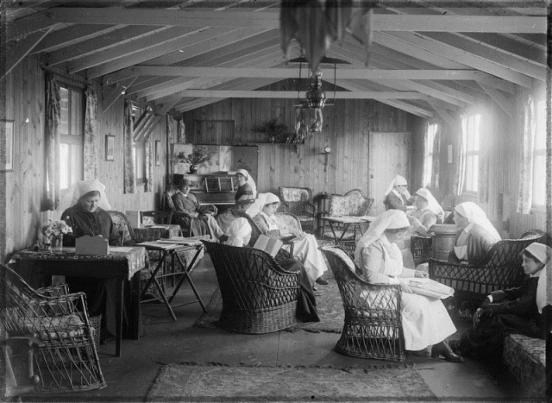
Princess Victoria Rest Club, Etaples, provided facilities for reading, writing, taking tea and relaxation [IWM Q3170]
Some activities were more controversial. Going to the cinema would undoubtedly put nurses at risk of having to mix with the rank and file soldier and assurances were needed about their safety. Considering that all these women were over the age of twenty-three and most of them considerably older, it might be expected that they had already been subject to far more hazardous excursions in their daily lives:
D.M.S., 3rd Army, rang up to know whether the Sisters of 12 Stationary Hospital could go to the cinema. Said it was a very excellent and well regulated entertainment, and he would arrange for them to be taken there and brought back by ambulance – it was a special entertainment. This was sanctioned.[173]
Whether to permit the use of bicycles was another difficult area for the Matron-in-Chief to cope with. Although she put forward reasons for it not being recommended, she could not argue with an order given by the Director-General of Medical Services and had to concede defeat on this point:
Received memo from D.G.M.S. stating that during a recent tour it had come to his notice that nursing sisters and V.A.D. Members in Military Units were not allowed to ride bicycles, although this rule does not apply to B.R.C.S. in Overseas Hospitals, and saying that to make such a distinction is invidious; instructions should be issued that all sisters and V.A.D. Members may ride bicycles if they wish to do so. Replied that no orders have been issued from this office to the effect that members of the Nursing Staff are not permitted to ride bicycles. Bicycling is not encouraged for the following reasons (1) the Active service kit of Trained nurses is not intended for bicycling, (2) the limited accommodation available for storing bicycles, and in the B.R.C.S. units the staff is stationary, whereas in British units movement of members is unavoidable, and the addition of a bicycle to kit, when moving, would be a serious difficulty. In accordance with orders, Matrons will be informed that if any Nursing Sisters or V.A.D. Members wish to ride a bicycle, they may do so.[174]
The majority of the Base Hospitals were sited on the French coast, and although swimming seems to be a harmless pursuit and was, in theory, permissible, there were various problems which resulted in it being strictly controlled or banned. Some of the restrictions were put in place because of the dangers caused by strong currents and there were a number of deaths during wartime caused by drowning both in rivers and the sea. Captain Edward Bell, a medical officer working at No.5 British Red Cross Hospital, Wimereux, drowned on the 11th July 1916 while taking an evening swim, and the hazards of the sea could be sudden and unpredictable.[175] When Sister Florence Hyndman got into difficulties while staying at a nurses’ rest home at Hardelot she was lucky to survive due only to the heroic actions of one of her colleagues:
Learnt that Sister Hyndman while bathing had been nearly drowned and was saved by Miss Jenkins a strong swimmer who brought her in in an unconscious state. They had been staying with Lady Gifford and were bathing at Hardelot. The O.C. of Hardelot shewing them great kindness … after lunch to Hardelot to see Lady Gifford’s Home with Matron Gill and to thank Lady Gifford for all her kindness to Miss Hyndman – Miss Jenkins the rescuer still there – Miss Hyndman going to 14 General tomorrow, leave to be arranged from there. Miss Jenkins to be recommended for the Albert Medal.[176]
The summer of 1915 was full of incidents relating to problems with swimming, either because of the dangers of the sea, or the dangers from men. Miss McCarthy appears to have had some difficulty in deciding between the seriousness of the two evils and it’s not clear which one her remarks are aimed at here:
Arrived 1.30pm – found Miss Hills waiting for me. Very worried about VADs 2 of whom had nearly drowned bathing and in consequence of the unsafe nature of the ground, they had been permitted to go and bathe with officers. This I said must be discontinued at once …[177]
The usual punishment at that time for misdemeanours particularly of a social nature was to be returned to the United Kingdom as ‘unsuitable for further service in France’:
Letters from Miss A. B. Smith and Miss Tunley reporting a Mrs. O’Dwyer for bathing with an orderly. She admits to bathing once by chance and once by arrangement at 5am. Wrote M-in-C and suggested she should be sent home and that no official report of the incident should be sent through the usual channels.[178]
There was an extensive list of things not permitted during off duty time which included smoking, hockey, dining-out and taking part in plays and entertainments put on for either hospital staff or soldiers – a part in ‘The Follies’ was definitely not an approved pursuit for nurses:
To Capt. Kingscote in reply to a request that some of the Nurses in Rouen might assist in some “Follie Entertainment” which he is getting up for the benefit of men in Hospitals, and then in Camp. Said it would not be possible to arrange this, but I knew the Staffs from every hospital would assist in every way to have everything in readiness at each Hospital and would look forward to entertaining them all in their Mess when the show was over. Suggested that some of the many ladies not engaged in nursing duties in Rouen might be able to assist.[179]
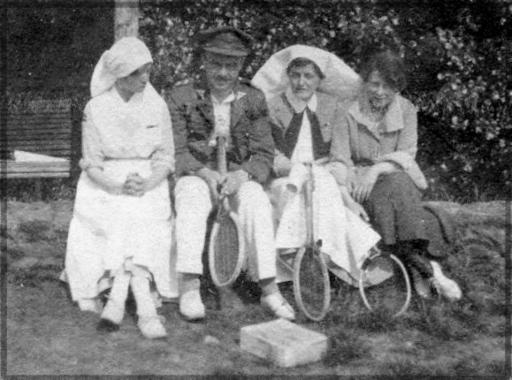
A Tennis party at No.35 General Hospital, Calais, 1919
Just as we had finished a mountainous omelette a feminine voice rang through the hall loudly demanding lunch. “Good God! It’s the Matron-in-Chief,” said Gratton, looking round distractedly for somewhere to hide. But the Major’s mind was evidently more alert than I had thought, or perhaps fear may have stimulated it, because in one movement he seized his plate, glass, knife and fork, and before the door could open he had jumped through the window into the garden and was sitting at a little iron-topped table with his back to us. The Matron-in-Chief came in and looked extremely suspicious when she saw us sitting there alone … We rose at once, of course, and stood to attention. Matron-in-Chief asked us a few questions about the unit to which we belonged, and we answered with painstaking conscientiousness … [later] We met again and congratulated the Major on his duplicity. It was all very amusing and childish, but the consequences of being found out would have been neither! Very probably Major Brewer would have been sent up the line and we should have found ourselves cleaning vegetables for sick sisters at Abbeville or carrying trays to convalescent officer.[180]
By far the most popular pastimes were walking, visits to local towns and sites of interest and eating in local cafés and teashops. VAD Dorothea Crewdson spent much of her off-duty time walking on the cliffs at Le Tréport and when possible joined her colleagues for more enterprising outings.
Fraser had a day off too and persuaded us this morning to come down to Tréport and try our luck with a motor for an expedition. She went down first to order it if poss., and we met her later in front of Le Plage. She had failed to get a motor but hired a pony and governess cart at Mers and was going out driving with or without us, determined on some adventurous proceeding. She induced us finally to go too, so we all went by train to Mers and to the stable where we got on a conveyance drawn by a quiet, sober little steed – ‘cheval de dames’ – such a styled and neat little vehicle. A woman of hostelry and two very amateurish and unhorsey soldiers put the animal in, induced it with a bit of sugar and, after some urging, we moved off … Fraser was the charioteer and didn’t spare the whip, hoping to get some go out of our animal.[181]
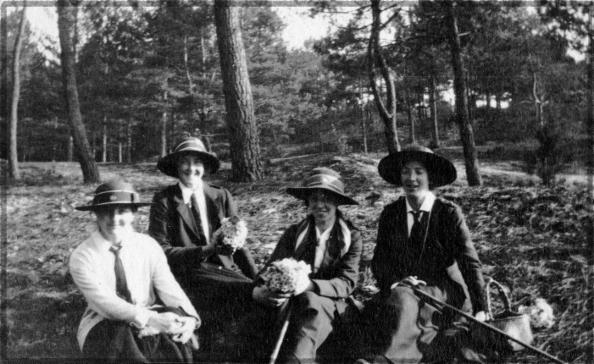
VADs in Hardelot Woods, 1916
QAIMNS Reserve Nursing Sister Edith Appleton spent much of her spare time in similar fashion, finding immense pleasure in the nature that surrounded her just a short walk away from the heartache and troubles of the hospital. She also enjoyed reading, attending concerts, lace-making, and once again motor trips whenever possible:
Three very charming VADs asked me to go on a little jaunt with them in what they call the ‘bus’ which is really quite a good Ford car. We went for a glorious two-and-a-half-hour spin through pretty villages and country to Harfleur and saw the damage done by the explosion at the bomb factory last month. The church was a good deal broken too, and the windows of nearby houses smashed. At some place, dead in the country, we passed an old French chateau with a moat around it, very old quaint towers and lovely grounds. We stopped just to gaze at it for a little while.[182]
One thing that was definitely forbidden for British nurses in France was dancing – either having dances in their own Mess or attending functions at Officers’ Messes by invitation. This was not a wartime rule, but dated to a much earlier period in the history of Queen Alexandra’s Imperial Military Nursing Service and originated with a question asked in the House of Commons by Athelstan Rendall, Member for the Thornbury constituency, Gloucestershire.
I beg to ask the Secretary of State for War whether he will explain why nurses at Netley Hospital, and in the Army's service generally, are not permitted when off duty, except when on furlough, to take part in public or private dances, seeing that the prohibition does not apply to medical men in the same hospitals; whether a highly trained professional class, such as nurses, are to be placed in a different position on the ground of sex to officers in the Army, who, provided they are on duty at the appointed time have no restrictions placed on their use of time when off duty; and whether he will at once free the nurses from this interference with their liberty.[183]When the Nursing Board of QAIMNS met six days later they upheld their decision for the following reasons:
… the late hours involved by attendance at balls and dances incapacitate Nurses for the due performance of their duties on the following day. If further reason is required it may be stated that the Nursing Board requires for Her Majesty’s Nursing Service gentlewomen who are devoted first and foremost to their work for its own sake and the sake of their patients, and who are content to live quietly and unostentatiously without craving for gaiety and excitement.[184]
During wartime, Matron-in-Chief Maud McCarthy maintained standards and discipline at all times by strict adherence to the rules and regulations of her service. She believed that this would ensure that all patients received the very best care possible from members of the nursing staff. She was frequently criticised for her stance, both by senior medical officers and particularly from members of the Canadian Army Medical Corps, a criticism that continues even today. However, she was firm in her resolve that patients’ welfare came before anything, even her nurses’ periods of relaxation. On 5th October, 1917 after a visit to No.4 General Hospital, she wrote:
At the time of the visit it was extremely full of seriously wounded patients and they were evacuating and taking in at the same time. I saw the O.C. and discussed with him the question of dancing which apparently, without my knowledge, has been customary both in the sisters’ mess and elsewhere. I pointed out to him that it was entirely against regulations and could not be permitted until I got some authority on the subject. I also pointed out that with a large mess such as they were, with over 100 people, it is out of the question to think that entertainments of this kind could be looked upon as a little dance. I considered dancing in peace time quite suitable and a delightful recreation but at the present moment the object for which we were out here would not be overlooked. Either the sick and wounded were going to be nursed or we were going to dance.[185]
For women who not only went to dances but were also unlucky or foolish enough to be discovered, the punishment could be severe, but that will be left for a later chapter.[186] It was not until Christmas 1918, six weeks after the Armistice, that the Matron-in-Chief finally relented and gave official approval to nurses dancing in British Messes for a few short days during the holiday period, and then not again until six months later for a slightly longer spell:
Received wire from the War Office, granting permission for Nursing Staff to attend dances during Peace Celebrations to be limited to 30 days from receipt of this telegram. Matrons’ discretion to be final as to number of dances attended weekly. Nursing efficiency to be maintained.[187]
Nurses in base hospitals heard many stories from their patients about life at the ‘front,’ and also scoured the daily papers for news of how the war was progressing. In reality, their lives were circumscribed by the boundaries of their hospital and they had little or no experience of the devastation that lay just a few miles to the east. After the Armistice organised trips were arranged to give some the opportunity to visit places whose names had become familiar and to view the desolation and ruin of the battlefields:
Major Lord Greville came to the Office with reference to the three day trips which he was arranging for the benefit of Nurses and V.A.D. Members from both Calais and Boulogne Bases on three successive days, parties to consist of 14 members with a Conducting Officer in attendance, and I arranged that a senior Member of the Service should be in charge of each party. These trips were to begin on 20th instant, and the parties from Calais would finish the trip at Boulogne, and the Boulogne parties at Calais. The programme drawn up is as follows:-1st day: Leave for Blendeques. Sleep at Blendeques. 2nd day: Arras, Vimy Ridge, Lens, La Bassee, Gezaincourt. Sleep at Gezaincourt. 3rd day: Somme Battlefield, Bapaume, Albert. Sleep at (Boulogne) or (Calais). The Principal Matrons of the Areas were issued with full instructions regarding these trips, and the names of the Members selected were also notified.[188]
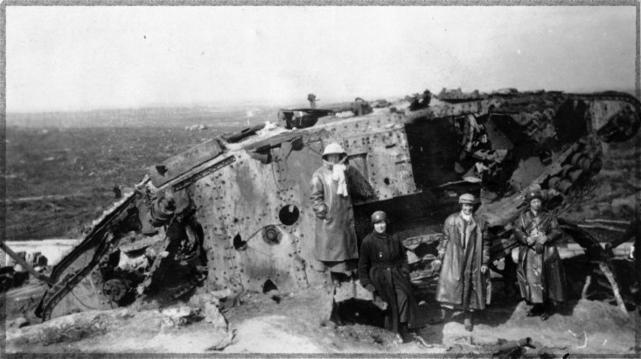
A tank on the Menin Road - nurses visiting the battlefields in 1919
For the small number of nurses who were chosen to go on these trips it must have been both an over-aweing and enjoyable experience and one which would have affected them profoundly. With thousands of nurses working in France and Flanders at any one time it would be untrue to suggest that all nurses kept strictly to the rules about what was suitable as a leisure pursuit. In letters and memoirs some relate tales of hopping on lorries and midnight trains to reach places that would never be officially sanctioned but for which they felt the experience outweighed the risk. However, most surviving records show that the majority of nurses were very aware of the restrictions placed upon them and did their best to conform. They’d been born in a time when women’s lives were bound by codes of conduct much stricter than those of today and as a group accepted the restraints placed upon them during wartime.
*****
[167] A History of the Nursing Profession; Brian Abel-Smith; Heinemann, 1960, p.137. ‘In 1919 an inquiry conducted by the College of Nursing suggested that hours varied between 52½ and 71 hours per week for day duty, and between 59 and 84 hours for night duty.’
[168] War Diary of the Matron-in-Chief, The National Archives, WO95/3988, 28 December 1915
[169] War Diary of the Matron-in-Chief, The National Archives, WO95/3988, 19 July 1915
[170] War Diary of the Matron-in-Chief, The National Archives, WO95/3989, 8 April 1916
[171] See, for instance, the writings of Kate Evelyn Luard, Diary of a Nursing Sister on the Western Front and Unknown Warriors, details of both on the ‘Books’ page
[172] General Routine Order 4147 of 3rd May 1918.
[173] War Diary of the Matron-in-Chief, The National Archives, WO95/3989, 25 October 1916
[174] War Diary of the Matron-in-Chief, The National Archives, WO95/3989, 3 July 1917
[175] Old Birkonians Society Online: http://www.obs.org.uk/
[176] War Diary of the Matron-in-Chief, The National Archives, WO95/3988, 15 July 1915 and 20 July 1915
[177] War Diary of the Matron-in-Chief, The National Archives, WO95/3988, 3 August 1915
[178] War Diary of Matron in Chief, The National Archives, WO95/3988, 5 August 1915
[179] War Diary of Matron-in-Chief, The National Archives, WO95/3988, 27 October 1915
[180] Four Years out of Life, Lesley Smith; Philip Allan, 1931, page 95
[181] Dorothea’s War; The Diaries of a First World War Nurse; ed. Richard Crewdson; Weidenfeld & Nicolson, London, 2013, page 65
[182] A Nurse at the Front, The First World War Diaries of Sister Edith Appleton, edited by Ruth Cowen; Simon and Schuster 2012, page 92
[183] Hansard, 25 October 1906
[184] Minutes and Proceedings of the Nursing Board for QAIMNS; The National Archives WO243/24, 31 October 1906
[185] War Diary of the Matron-in-Chief, The National Archives, WO95/3990, 5 October 1917
[186] See section seventeen, ‘Discipline.’
[187] War Diary of the Matron-in-Chief, The National Archives, WO95/3991, 3 July 1919
[188] War Diary of the Matron-in-Chief, The National Archives, WO95/3991, 15 January 1919